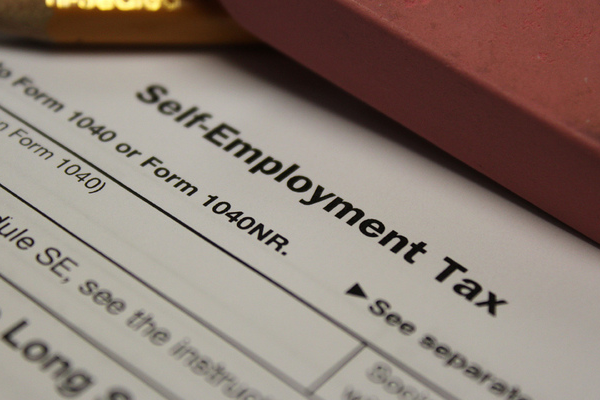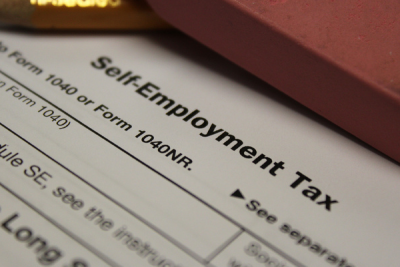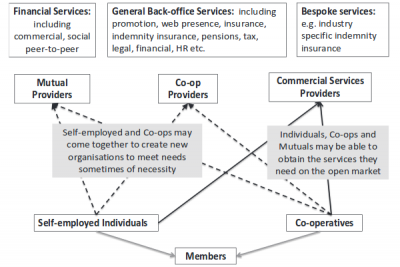
Cooperative and Trade Union Solutions for the Gig Economy
[Editior's note: this article discusses the Not Alone report, recently released by Co-operatives UK, Wales Co-operative Centre, and Unity Trust Bank. Cooperators may be especially interested in section 6 which places platform cooperative efforts within a broader context and landscape, and highlights the need to unite past and future innovations in economic democracy. As Pat put it in an email to us, "The report highlights so much [that is] below the radar and not at all joined up well in any of the countries. But if we can raise people’s sights higher, we can tip elections with a real practical programme and achieve much more internationally that is presently impeded so badly." The report is embedded at the bottom of the page.]
 A proliferation of atypical forms of work in Europe has become known as ‘The Gig Economy’. For many, a permanent state of social economic uncertainty is the new normal. Casual work, temping, zero hour contracts and diverse forms of self-employment are characteristic of this brave new world of ‘precarious work’.
A proliferation of atypical forms of work in Europe has become known as ‘The Gig Economy’. For many, a permanent state of social economic uncertainty is the new normal. Casual work, temping, zero hour contracts and diverse forms of self-employment are characteristic of this brave new world of ‘precarious work’.
Self-employment has become the new yeast in the UK economy dough. 4.6 million today are self-employed (15% of the workforce) and since 2008 they have created two-thirds of new jobs. The record rise of self-employment is unprecedented. By 2018 it is expected that more people will be in self-employment than in public sector jobs.
While a proportion of the self-employed do well financially, they are today the exception. Indeed the stereotype of the self-employed as small businesses is less true than ever before. 83% of the UK self-employed work alone. Average earnings are far too low to employ anyone else. The median annual income of the self-employed plummeted from £15,000 in 2008 to £10,400 in 2013. Low pay however is only part of the picture. An absence of worker rights and support services aggravates hardship and makes matters worse.
Under European Union regulations temporary and agency staff are entitled as ‘workers’ to sickness and holiday pay. This is not the case for self-employed as the Not Alone report highlights. By contrast with other workers, most self-employed people bear the full costs for office space, tools and equipment, heating and lighting, workplace insurance and pension savings. They also have to put in days of work unpaid for bidding, negotiating contracts, tax and national insurance administration, billing, accounts management and debt collection.
How can self-employed workers overcome lop-sided risks, over-bearing costs and additionally secure fair trade terms and conditions? To avoid ‘walking alone’, some freelancers are rediscovering solidarity, co-operation and the logic of mutual aid. Trade unions in the media sector in Germany, Scandinavia and the UK have been demonstrating ways to do this.
The Federation of Entertainment Unions (FEU) is the UK network of trade unions in media. Members include the National Union of Journalists (NUJ), BECTU, Equity and the Musicians Union; all have a high proportion of self-employed members. A common FEU strategy is to secure ‘worker status’ for their freelance members and then to negotiate worker rights.
Co-operatively owned employment agencies can provide the operational means to achieve this outcome and especially if backed by a trade union. For example, faced by rising agency fees, 50 music teachers in Swindon formed a co-op to market their services to schools, to assist with negotiations and to provide other collective services. The Musicians Union and Co-operatives UK have jointly promoted this strategy and music supply teachers in many other regions have done the same.
Likewise Actors Co-ops have steadily expanded to 30 in England and Wales. Through their Co-operative Personal Management Association (CPMA) they work closely with Equity, the actor’s union.
 Co-operatives UK supported RICOL, a co-operative agency for interpreters and translators, that was set up in 2012 after the interpreting service for the law courts was contracted out to Capita who reduced the terms and conditions on offer.
Co-operatives UK supported RICOL, a co-operative agency for interpreters and translators, that was set up in 2012 after the interpreting service for the law courts was contracted out to Capita who reduced the terms and conditions on offer.
Co-operative innovators in France and Belgium have developed integrated services for self-employed workers in relation to affordable workspace, back office services, debt collection, low-cost insurance and for securing sickness and benefit payments from the state. These Business and Employment Co-operatives (BECs) pioneers include the CAE network in France with 72 local co-operatives and Smart in Belgium - a co-operative with over 60,000 members.
In the USA, new Union Co-ops are emerging. Under a joint agreement, the US Steelworkers, the largest union in the USA, and the successful Mondragon Co-operatives from Spain are co-developing the model. Union Co-ops are being set up in a range of industries and cities from Pittsburg to Los Angeles. In Cincinnati, Ohio, there are seven Union Co-ops including a food hub, a railway manufacturer, a ‘green laundry’ and a jewellery manufacturer.
The Freelancers Union in the USA has developed as a mutual to provide insurance and other legal and advocacy services for more than 280,000 members. In the Netherlands and in Spain, general unions for the self-employed have emerged and developed since the 1990s. UPTA in Spain has 100,000 members.
To help secure rights for self-employed workers, the International TUC, the ILO and the International Co-operative Alliance have developed an organisers’ handbook. Solidarity economy strategies are growing but are still fragmented. Bringing together best practice internationally could trigger a new game plan that might snowball by bringing together solidarity solutions. The trade union and co-operative movements need to unite their efforts to make this happen.
Go to the GEO front page

Add new comment